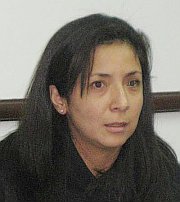In depth
Civil society and victims as the subjects of rights in the Peruvian transition process

Sonia Paredes
Political violence in Peru has mainly taken place in the country's Andean and Amazon regions, and mainly in rural communities, dwellings and settlements. For 20 years, thousands of Peruvians have lived in a state of constant fear and suspicion, due to the intensity of violence and the lack of protection from the State against the massive violations of their basic rights by two groups in conflict, subversive groups and the agents of the State. The victims were basically poor peasants, whose mother tongue was Quechua or other indigenous languages, and who were the most socially excluded group in the entire country.
In view of the impassiveness of the State, which subsequently became a counter-subversive offensive against their rights, the victims' families began to meet and organise, and make civil claims for cases of extrajudicial murders and assassinations, and to demand information on the whereabouts of their loved ones. As a result, the first organisations of relatives were formed, which consisted mainly of women seeking their husbands, sons or fathers, who had been arrested or had disappeared. The most important and the oldest is ANFASEP (the (National Association of Relatives of the Family Kidnapped, Detained and Disappeared of Peru).
ANFASEP, like the other organisations, sought to be a channel for representing the particular claims of its members, and was supported by non-governmental human rights organisations, which above all provided legal support during the search for the disappeared. The alliance between the organisations of victims' relatives and the human rights NGOs became even stronger in subsequent years of conflict, especially during the political repression by the regime of Alberto Fujimori in the 1990s.
Although the idea that reparations must be made by the State is supported unanimously, as it is a right of the victims and an obligation of the government, campaigning initiatives and proposals from civil society have been vital in achieving breakthroughs in this area. As it is a measure that requires a great deal of political will for its design and implementation, the reparations process has always involved the active participation of civil society, of both victims' organisations and human rights NGOs, who have been insistent in their demands and proposals. The roles of the two groups have changed over time, but in the majority of cases the central role of the victims has continued, while the NGOs have provided advice and support. The NGOs direct campaigning role has been accompanied by initiatives for strengthening the position of the leaders of these organisations, so that they also have sufficient resources to direct the campaign and build proposals from the grassroots.
Despite the efforts of the two groups, the weakening of the victims' organisations, which in most cases is a result of frustration at a long struggle, as well as a change of generations in the leadership of the organisations, was almost foreseeable. This is in addition to the fact that many organisations lack legitimacy in the hardest-hit areas, such as peasant and indigenous communities. Many of the victims' leaders have an urban background, which has no strong links with the more distant rural areas, which were paradoxically the hardest hit. Meanwhile, in the peasant and indigenous communities affected by the conflict, violence broke down the organisational links and the social capital that characterises them, and which determines their way of life, and this had a negative effect on their organisations. The communities' agenda is dominated by agriculture and fishing issues, defence of their territory as indigenous groups in some cases, and management of their natural resources in the face of exploitative economic policies. Social and political exclusion in these cases has led to a loss of identity and a lack of a sense of belonging to the nation as a whole. Their relationship with the State is determined by destitution and poverty, and instead of citizens, they feel like beneficiaries of a social aid programme.
Reconciliation is not yet a national project, as it has not succeeded in involving all sectors of society, as they are unaware of conflict and also have no intention of becoming aware of it. The participation of a sector of society calling for attention for the victims aims to build a bridge between these two worlds, but could also be a factor for detachment, as it could polarise opinions between those who have experienced the conflict and those who do not acknowledge its real dimension. However, there can be no transition without taking the demands of the victims into account, and not only as a subject for attention by the State for the damage caused, but also as legal subjects and players in the reconstruction process of a new relationship with the State that involves society as a whole. It is therefore a question of laying the foundations for a new social contract. There are many possible scenarios, and those involved are willing. It is an ambitious undertaking, but possible.